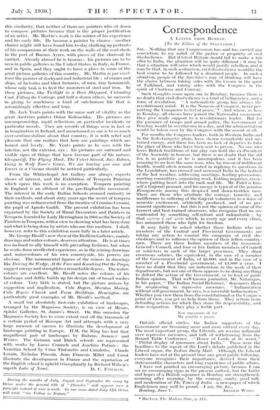Correspondence
A LETTER FROM BOMBAY.
[To the Editor of the Su•v:eT:oeoa.j Sin,— Nothing that any Congressman has said has carried any conviction, to my mind, of the justice or propriety of civil disobedience. But if Great Britain should fail to make a fair offer to India, the situation will be quite different : it may be that a situation will arise which would justify rebellion. and it may be that, in such a situation, civil disobedience would be the best course to be followed by a disarmed people. in such a situation, people of the Spectator's way of thinking will have the choice between taking sides with the Crown in the spirit of Falkland, and taking sides with the Congress in the spirit of Chatham and Conway.
Such thoughts come upon one in Bombay, because there is no doubt that civil disobedience is a kind of belligereney, :Ind a form of revolution. '- A nationalistic group has always the revolutionary mind. It is the Nemesis of Conquest. never per- mitting the Conqueror to feel at peace."* And where, as here
in Bombay, all classes have j ' I the Nationalist nmvement, they give ready support to a revolutionary leader. But for the presence of troops and armed police, the Government of Bombay would be overt hrown in a day, and the administration would be taken over by the Congress with the assent of all.
For months the Congress leaders, both in Western India and in the Indo-Gangetic plain, have shown remarkable and sus- tained energy, and there has been no lank of deputies to take the place of those who have been sent to prison. No one who loves British traditions of fair play can hold the ex-President of the Assembly in honour, but there is no doubt that the old fox is as patriotic as he is unscrupulous. and it has been amazing to see how• the same man, who, 1)y reason of indifferent health, would often remain seated in replying to questions in the Legislature, has crossed and recrossed India in the hottest of the hot weather, addressing meetings, leading processions, meeting committees, organizing work, holding inquiries, every- where putting heart into the rank and file. Mr. Patel is him- self a Gujerati peasant, and his energy is typical of the genuine Risorgimento among this despised and down-trodden race. There are those who attribute the courage, tenacity, and indifference to suffering of the Gujerat volunteers to it wave of neurotic excitement, artificially produced, and of no per- manent significance : but this is not the opinion of sortie of the keenest and best-trained observers, who recognize that we are confronted by something self-reliant and indomitable : by that sparr It may fairly be asked whether those Indians who are members of the Central and Provincial Governments are taking any action to combat the campaign of civil dis- obedience and to influence the opinion of their fellow-country- men. There are three Indian members of the Governor- General's Council, and four or live Indian members "1 Council or ministers in each of the larger provinces. They draw enormous salaries, the equivalent, in the ease of a member of the Government of India, of £6,000, and in the case of a member of a Provincial government, of 13,800 a 3-ear. I have no doubt that they are industrious in the work of their departments, but not one of them appears to be doing anything to defend the action of the Government, or to lead or g " he Indian opinion. That well-known journalist, Mr. Naturajan, in his paper, "The Indian Social Reformer," denounces them for acquiescing in repressive measures. " tion without self-government, he says, is a miserable hallueination." Whether you view them from the• constitutional or the Congreis point of view, you get no help from them. They refrain boat defending actions for which they share the responsibility, and from resignation. They play a feeble part. Non ragionam di for Ma guarda c passa. Outside oMcial circles, the Indian supporters of the Government arc bee • g more and more critical every day. The most important group, the Liberals, are waxing indignant over repressive measures, and talk of withdrawing from the Round Table Conference. " House of Lords at its worit," "- Pitiful display of ignorance about India." These were the headlines to the report of the Lord's debate published in the Liberal organ, the Indian Daily Mail. Although the Liberal leaders have not at the present time any great public following, everyone recognizes their importance, derived from their statesmanlike characters and long experience of public affairs. I have not painted an encouraging picture, because I can see no encouraging signs, in the present outhx,k, but the faiths -arid hopes of a British sojourner in Bombay are strengthened, morning after morning, by the courage, sanity, good will, and moderation of The Times of India—a newspaper of which Englishmen may well be proud—I am, Sir, &c., Maelver, The Modern State, p. 217.










































 Previous page
Previous page